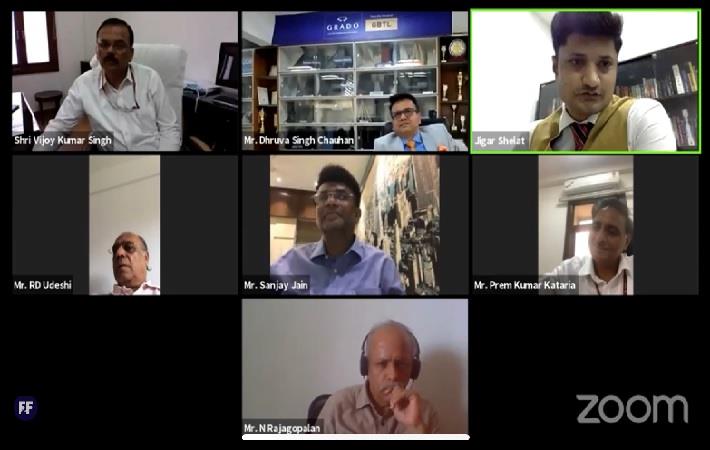Fibre2Fashion's webinar: Survival of the Fittest

At a time when the US and Western Europe are looking for alternatives to import from China, Indian companies will need to move out of commodity product categories and move towards making specialty products, said RD Udeshi, president – Polyester Chain, Reliance Industries Limited (RIL), during the webinar on 'Survival of the Fittest: How will Indian Manufacturers revive post Covid-19?'
Speaking about the polyester industry, Udeshi said India is at No.2, but the gap between No.1 and No.2 is huge. China produces roughly 50 million tons of manmade fibre (MMF), while India struggles to produce 6-7 million tons. If Indian textiles-apparel industry is to reach $350 million, the country would need another 18 million tons of fibre. The production of cotton fibre is not likely to go up much and may limit around 6 million tons. So, India needs to do a lot of work not only on MMF but the entire polyester chain.
Secondly, Udeshi said, there is imbalance in China, as upstream is produced in full capacity and downstream is struggling. Given that there will be demand contraction in India, if dumping of upstream products from the neighbouring country increases, it will make it difficult for Indian companies to survive.
Focusing on the ginning and spinning industry, Sanjay Jain, MD – TT Limited & Immediate Past President of Confederation of Indian Textile Industry (CITI), said the industry is in bad shape, primarily because there is no demand. He said, "Demand destruction is already being felt by suppliers. Supply destruction will be felt once things normalise. How ginning and spinning can make-up the huge losses is a big question."
For the ginning and spinning industry, according to him, pushing exports is the only way to survive.
On the China opportunity, Jain said, India is not prepared to take on China in terms of efficiency, infrastructure, etc. Moreover, liquidity for new investment is going to be limited, and that too limited to very few people. So, the industry is looking up to the government for directions.
N Rajagopalan, director at Trigger Apparels Limited, said that from manufacturing point of view, all pipeline stock will be cleared in the coming months. So, the industry needs to re-adjust business plan according to market demand. "Little bit of hand-holding and transparent communication between manufacturing and brand owners, and brand owners and retailers is needed."
According to him, PPE is a new business, and not an alternative to the existing business. "It is low value, high volume business."
Use of anti-viral and anti-microbial fabrics will become the new norm in day-to-day apparel, said. Dhruva Singh Chauhan, director, GBTL Ltd, during the webinar organised by Fibre2Fashion. He added that GBTL's R&D was working since January this year and they have come up with a game-changer Neo Tech technology.
In the post-COVID-19 world, products need to be different and distinctive. "What we have to look at is whether our product will remain relevant to the market. Innovation helps in making products that are relevant to the market," Chauhan added.
In his capacity as Guest Speaker, Vijoy Kumar Singh, additional secretary - Ministry of Textiles, Government of India, said "climate is changing very fast. Ministry and trade associations will have to work cohesively to help the industry overcome losses."
"The Indian textiles industry has to make sure that it is competitive and very very innovative like the PPE experiment, in which the country has been successful in producing a very large number of PPE in a very short time," said Prem Kumar Kataria, Ex. Special Secretary, Ministry of Textiles, who also joined the webinar as a Guest Speaker.
"We need to understand demand pattern, and re-orient our manufacturing capacities and capabilities to synergise with the demand pattern," he added.
In the post-COVID-19 period, Udeshi said, survival will come by thinking differently. Citing the example of PPE, he said the garmenting industry never thought it would venture into production of PPE. He said Indian textiles-garment exports can grow to $100 billion from the current $33 billion but that would require hand-holding by the government, in addition to thinking beyond what the industry is doing today.
"Now is the time to start repairing. Don't sell your stock at loss, because production is not going to be at 100 per cent even for the next 60 days. So, margins are going to be better, going forward," said Jain. Unexpected gains will be there for first movers, just like people who ventured into PPE got, he added.
"Indian manufacturers need to recalibrate and make products that consumers will be looking for. Online is going to definitely pick-up, so you have to ensure that you are on the online platform. Touch points have to reduce. Consumption would fall 25-30 per cent in domestic market, and part of that fall has already happened. Amount of liquidity promised to be injected by the government is going to make a big difference," said Jain.
He said more joint ventures would be needed so liquidity can flow in. "It’s a changed world and we need to work in a changed fashion."
Giving an assurance on behalf of the textiles ministry, Singh said: "We are very alert and you would see ministry working more pro-actively."
Fibre2Fashion News Desk (RKS)
































-Ltd..jpg?tr=w-120,h-60,c-at_max,cm-pad_resize,bg-ffffff)





.jpg?tr=w-120,h-60,c-at_max,cm-pad_resize,bg-ffffff)
.jpg?tr=w-120,h-60,c-at_max,cm-pad_resize,bg-ffffff)






